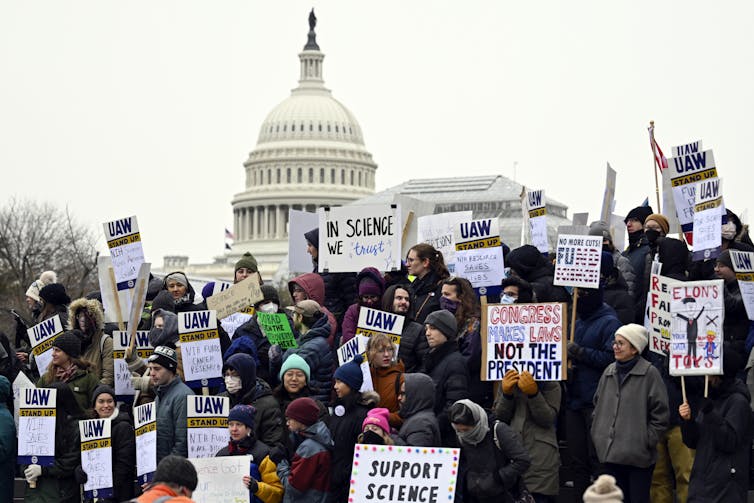Dayton is a policy advocate and Lindgrensavage is a counsel at Protect Democracy, a nonprofit group advocating for policies that "prevent our democracy from declining into a more authoritarian form of government." Dayton once worked for a GOP House member and Lindgrensavage for a Democratic senator.
Imagine this: The conduct of the previous presidential administration has crystallized the need for Congress to reassert its constitutional authority as a check on the executive branch.
The year is 2021, to be sure. But it was also 1974. In the wake of the Watergate scandal, lawmakers of both parties acted to address weaknesses in federal laws and government institutions that Richard Nixon had either created himself or exposed.
Nearly half a century later the Protecting Our Democracy Act, a package of good-government reforms first proposed by Democratic Rep. Adam Schiff of California in September, aims to take similar steps toward restoring guardrails on executive power. The legislation is on course for a reintroduction in the House this month.
To raise awareness about the bill and advocate for its passage, experts from half a dozen democracy reform advocacy groups from across the political spectrum have written pieces touting its various virtues. These will appear in the Opinion section of The Fulcrum in coming weeks.
Sign up for The Fulcrum newsletter
These individual analyses do not constitute an endorsement of the full package. What they demonstrate in combination, rather, is how the multifaceted measure draws from ideas proposed by Republicans and Democrats alike — and how Congress' constitutional prerogatives, not ideology, explain why they fit together.
The Protecting Our Democracy Act, which also goes by the acronym PODA, tackles a dozen different topics:
- Limiting the president's pardon power.
- Extending the deadline for prosecuting former presidents and vice presidents for federal crimes before or during their time in office.
- Enforcing the constitutional ban on presidents using the office to enrich themselves.
- Boosting enforcement of congressional subpoenas.
- Reasserting Congress' power of the purse.
- Mandating disclosure of contacts between the White House and Justice Department.
- Strengthening protections for inspectors general.
- Strengthening protections for federal whistleblowers.
- Ensuring the Senate's say in confirming executive branch officials.
- Bolstering enforcement of the Hatch Act.
- Preventing foreign interference in elections.
- Clarifying federal prohibitions on foreign assistance to campaigns.
Some of the proposals respond directly to vulnerabilities in presidential power exploited by the Trump administration, treating those abuses as lessons from which the need for reform must be learned.
It will remain difficult to hold future presidents accountable for violating the Emoluments Clause, the Constitution's ban on presidential profiteering, or attempting to sway the independence of the Justice Department, for example, without Congress creating mechanisms to guarantee such accountability.
Some of the proposals have a history of bipartisan backing — or began as Republican ideas. The provision to strengthen congressional control over the allocation of federal funds, for example, resembles a bill by Republican Sen. Mike Lee of Utah that the Homeland Security and Government Affairs Committee approved last year on an 11-2 vote. And improving protections for inspectors general and federal whistleblowers has been a longstanding priority of the most senior GOP senator, Chuck Grassley of Iowa..
The Protecting Our Democracy Act meets this current moment in two important ways.
First, it is the right response, and it is similar to a past, successful response in the aftermath to a similar period in our history. After Nixon's resignation, both Republican and Democratic lawmakers understood how his behavior had exposed weaknesses in the system of checks and balances that constrains presidential power, and they responded by enacting laws such as the Privacy Act and the Inspector General Act.
The parallels to today are now widely acknowledged by experts on the right, left and center. Trump "has revealed that the presidency is due for an overhaul for accountability akin to the 1974 reforms," Jack Goldsmith, an assistant attorney general in the George W. Bush administration, told the New York Times. (He and a White House counsel during the Obama administration, Robert Bauer, have come up with their own set of ideas for recalibrating the balance of power.)
Second, PODA responds to increasing numbers of lawmakers asking why their branch is so ineffective relative to the executive and the judiciary. Republican Sen. Ben Sasse of Nebraska, a frequent observer of this development, spent part of his time during last month's confirmation hearing for Attorney General Merrick Garland offering his views.
"I think it's a mix of overreach by Article II and underreach by Article I," he said, adding that it's not "as if everything that's wrong is chiefly outside the Congress, because I think we're probably chiefly to blame."
The Protecting Our Democracy Act gives Congress an opportunity to retake some of its authority and live up to its responsibility.
Ensuring the proper checks and balances between the executive and legislative branches is an ongoing obligation of Congress. But it hasn't kept pace in recent years with the expansion of presidential power or deterred presidents of both parties from exceeding — even abusing — their authority.
This House bill is a big first step on the path to catching up. The fact that Democrats are going to introduce this package when the president is a member of their party should not escape notice. Nor should the repeated instances of Republicans who have voiced concerns and floated measures about the relationship between the president and Congress. The opportunity to bring Republicans and Democrats together to act is now.






















